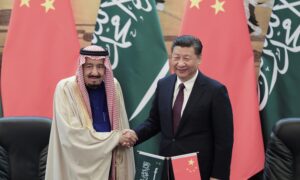Xi’s Saudi Summit and the United States’ Weakening Global Position
CommentaryIn international relations, appearances are key. The enormous difference between the lavish welcome and fruitful trip of Chinese leader Xi Jinping to Saudi Arabia versus U.S. President Joe Biden’s unsuccessful July visit to Riyadh is therefore not inconsequential. Quite the opposite. It is indicative of the fundamentally shifting nature of geopolitics and a U.S. administration that simultaneously reduces the country’s geopolitical position while creating a mockery of its culture and people. While other nations seek to act in their national interest, Washington prioritizes ideologically fueled left-wing policies that harm the American people. Xi was welcomed graciously by his Arab hosts as the two parties discussed steps that would increase energy cooperation between their countries. He also focused on China’s continued efforts to have the yuan used in place of the dollar as the currency denomination for the Chinese-Saudi oil trade by utilizing the Shanghai Petroleum and National Gas Exchange as a payment platform. Such a move would signify a monumental shift in the geopolitical landscape to the advantage of Beijing. Since the rise of the petrodollar in the wake of then-President Richard Nixon’s decision to take the United States off the gold standard in 1973, the dollar has been the currency of choice for the world’s oil transactions. While it is highly unlikely that Riyadh would opt to denote a large portion of its energy exports to China in the yuan, even having the prospect on the table is therefore an explicit rebuke of the United States. However, that is not the only example of their defiance. Riyadh and other Gulf countries in OPEC+ have firmly refused U.S. pressure to condemn Russia for the ongoing war in Ukraine. They have also ignored Washington’s warnings against strengthening relations with Beijing. While China’s oil demand has been relatively muted due to the large-scale reduction in economic activity stemming from its zero-COVID policy, Saudi Arabia remains China’s top supplier. Xi’s trip to Riyadh also produced commitments to increase cooperation in other key areas related to energy. The incremental attempt to wean countries off the dollar is part of Beijing’s long-term strategy to replace the latter with the yuan as the world’s reserve currency. The United States is able to maintain its outsized international presence due to the fact that other countries hold large amounts of the dollar, and subsequently use it for international transactions, particularly in oil and gas. To avoid sounding alarmist, this is likely not a development that may happen in the short term. Beijing’s onerous capital controls on money flowing in and out of the country mean that a market for Chinese yuan would probably need to exist off of the mainland to enable such a system. Increasing the amount of its currency stored in central banks around the world in accordance with an amount that would supplant the U.S. dollar does not currently seem feasible. But one must always remember that the Chinese Communist Party (CCP) leadership is always thinking 10 moves ahead. And it’s definitely not on its own in seeking to get out from under the yoke of U.S. financial hegemony. Consider that at the beginning of the Russo-Ukraine War, Europe paid for only about 60 percent of its imports of Russian gas in the euro, with the rest being denoted in dollars. In the face of sanctions and Western attempts to crush the Russian economy, Moscow’s demand for countries to pay for gas imports in rubles forced many European gas buyers to open bank accounts denominated in the Russian currency in order to make payments. Putin’s move to peg the ruble to gold, which is also traded in dollars, essentially set a minimum price for the ruble relative to the dollar and allowed the Russian currency’s exchange rate to stabilize. After bottoming out in March, it currently stands at a rate that is 14.26 percent stronger than where it was at this time last year (December 2021) before the invasion of Ukraine. Russia is increasing its natural gas supply to China through the Power of Siberia pipeline, hitting a new maximum recorded level on Dec. 14—16.1 percent higher than previously contracted. On Dec. 7, another important section of the pipeline was put into operation, allowing gas to flow directly from Tai’an in the northern Shandong Province of China to Shanghai (China and Russia have also denoted their energy transactions in rubles and yuan). A Gazprom logo is seen on a gas processing column under construction at the Amur gas processing plant, part of the Power Of Siberia project, outside the far eastern town of Svobodny in Amur region, Russia, on Nov. 29, 2019. (Maxim Shemetov/Reuters) Furthermore, the Power of Siberia 2 Pipeline is set to begin construction by 2024, which will pass through Mongolia and be able to transport an additional 50 billion cubic meters of natural gas to China. According to Bloomberg, China’s total energy impo

Commentary
In international relations, appearances are key.
The enormous difference between the lavish welcome and fruitful trip of Chinese leader Xi Jinping to Saudi Arabia versus U.S. President Joe Biden’s unsuccessful July visit to Riyadh is therefore not inconsequential. Quite the opposite. It is indicative of the fundamentally shifting nature of geopolitics and a U.S. administration that simultaneously reduces the country’s geopolitical position while creating a mockery of its culture and people. While other nations seek to act in their national interest, Washington prioritizes ideologically fueled left-wing policies that harm the American people.
Xi was welcomed graciously by his Arab hosts as the two parties discussed steps that would increase energy cooperation between their countries. He also focused on China’s continued efforts to have the yuan used in place of the dollar as the currency denomination for the Chinese-Saudi oil trade by utilizing the Shanghai Petroleum and National Gas Exchange as a payment platform. Such a move would signify a monumental shift in the geopolitical landscape to the advantage of Beijing.
Since the rise of the petrodollar in the wake of then-President Richard Nixon’s decision to take the United States off the gold standard in 1973, the dollar has been the currency of choice for the world’s oil transactions. While it is highly unlikely that Riyadh would opt to denote a large portion of its energy exports to China in the yuan, even having the prospect on the table is therefore an explicit rebuke of the United States.
However, that is not the only example of their defiance. Riyadh and other Gulf countries in OPEC+ have firmly refused U.S. pressure to condemn Russia for the ongoing war in Ukraine. They have also ignored Washington’s warnings against strengthening relations with Beijing. While China’s oil demand has been relatively muted due to the large-scale reduction in economic activity stemming from its zero-COVID policy, Saudi Arabia remains China’s top supplier. Xi’s trip to Riyadh also produced commitments to increase cooperation in other key areas related to energy.
The incremental attempt to wean countries off the dollar is part of Beijing’s long-term strategy to replace the latter with the yuan as the world’s reserve currency. The United States is able to maintain its outsized international presence due to the fact that other countries hold large amounts of the dollar, and subsequently use it for international transactions, particularly in oil and gas.
To avoid sounding alarmist, this is likely not a development that may happen in the short term. Beijing’s onerous capital controls on money flowing in and out of the country mean that a market for Chinese yuan would probably need to exist off of the mainland to enable such a system. Increasing the amount of its currency stored in central banks around the world in accordance with an amount that would supplant the U.S. dollar does not currently seem feasible. But one must always remember that the Chinese Communist Party (CCP) leadership is always thinking 10 moves ahead.
And it’s definitely not on its own in seeking to get out from under the yoke of U.S. financial hegemony.
Consider that at the beginning of the Russo-Ukraine War, Europe paid for only about 60 percent of its imports of Russian gas in the euro, with the rest being denoted in dollars. In the face of sanctions and Western attempts to crush the Russian economy, Moscow’s demand for countries to pay for gas imports in rubles forced many European gas buyers to open bank accounts denominated in the Russian currency in order to make payments.
Putin’s move to peg the ruble to gold, which is also traded in dollars, essentially set a minimum price for the ruble relative to the dollar and allowed the Russian currency’s exchange rate to stabilize. After bottoming out in March, it currently stands at a rate that is 14.26 percent stronger than where it was at this time last year (December 2021) before the invasion of Ukraine.
Russia is increasing its natural gas supply to China through the Power of Siberia pipeline, hitting a new maximum recorded level on Dec. 14—16.1 percent higher than previously contracted. On Dec. 7, another important section of the pipeline was put into operation, allowing gas to flow directly from Tai’an in the northern Shandong Province of China to Shanghai (China and Russia have also denoted their energy transactions in rubles and yuan).

Furthermore, the Power of Siberia 2 Pipeline is set to begin construction by 2024, which will pass through Mongolia and be able to transport an additional 50 billion cubic meters of natural gas to China. According to Bloomberg, China’s total energy imports from Russia—which includes coal, oil, and natural gas—have reached $60 billion since the beginning of the Russo-Ukraine War. That is $35 billion more than in the same period of 2021. Moscow claims this will provide a more than sufficient replacement for the Nordstream 2 pipeline originally planned to supply gas from Russia to Europe through Germany.
Meanwhile, practically nothing came out of Biden’s July trip to Riyadh besides an awkward fist bump with Saudi Crown Prince Mohammed bin Salman. The administration failed to secure its sought-after commitment for Saudi Arabia to boost oil production. The United States remains central to Saudi Arabia’s political position in the Middle East not only by purchasing its oil, but through its defense contracts (of which China is also a competitor with the United States) and the presence of its armed forces.
Riyadh likely smelled weakness in the Biden administration. Riyadh knows that the United States is desperate for Saudi energy after the 46th president essentially ended oil and gas production in this country, and drained the U.S. strategic petroleum reserve (the nation’s emergency supply of crude oil) to its lowest level in nearly four decades. This would clearly be the time for the Saudis to exert pressure on Washington in a way that is strategically advantageous for them.
China is more than happy to reap the benefits of obliging the Saudis’ foreign policy. Just like it is more than happy to reap the benefits of cheap energy while the United States attempts to crush the Russian regime (not to mention drain its own weapons stocks and simultaneously send tens of billions of dollars to Ukraine). That is because, while one may despise the ideology of the CCP, China is a serious country that seeks to win.
And what does the United States care about? The recent drag show performance at the White House and Biden’s presidential announcement that we must protect the rights of minors to have irreversible gender reassignment surgery should tell you all you need to know about where our priorities lie.
While life gets harder here in this country and the U.S. global position continues to weaken, our enemies laugh at us.
Views expressed in this article are the opinions of the author and do not necessarily reflect the views of The Epoch Times.












